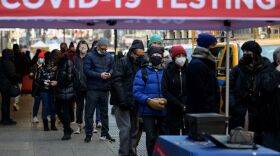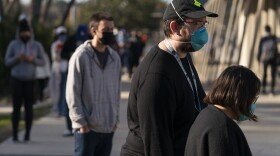The latest COVID-19 surge is causing staffing issues among health care providers in Austin who are already tired and burnt out from previous waves.
About 5% to 6% of staff at CommUnityCare has had to be out because they've had COVID or been exposed to it in recent weeks, according to Chief Medical Officer Dr. Nicholas Yagoda. CommUnityCare operates several clinics in Travis County that provide health care to the region’s uninsured population.
While symptoms may be less severe with omicron than with previous variants, particularly for people who are fully vaccinated, the sheer volume of cases is straining health care providers.
“For a workforce that’s already exhausted, [this omicron surge] actually continues the influx of patients at a very high level, but it also impacts our staff themselves as community members,” Yagoda said. “So, we are seeing more of our staff go out sick.”
At the same time, demand for services has increased. As more people get sick, more are in need of testing and guidance on how to isolate if they test positive — which is where clinics like CommUnityCare come in.
CommUnityCare is the largest provider of ambulatory services — or outpatient care — for the underinsured and uninsured in the region, Yagoda said. The health centers offer primary care, as well as other services, and have been offering COVID-19 testing to patients throughout the pandemic. Their patients are largely socioeconomically disadvantaged and people of color.
The combination of limited staff and high patient volumes has forced CommUnityCare to stretch resources, like moving patients to a different clinic when a doctor gets sick and employing telehealth services where it can. So far during this surge, none of the CommUnityCare clinics have had to shut down, Yagoda said. But staff members are tired and often working overtime.
“It requires a lot of resiliency and creativity in making sure that we're not losing access for our patients and for the most part, at this point, we have been able to hold up the same level of access for our community, who are also in significant need of our resources,” he said. “It's a tight balance that we have to keep.”
COVID-19 cases have been on the rise in Austin over the last few weeks spurred by the highly contagious omicron variant. Health officials say this variant now makes up more than 80% of cases in the Austin-Travis County area. The positivity rate in Travis County jumped to a record high of 30% this week, meaning about 1 in 3 tests administered came back positive.
Yagoda said CommUnityCare is seeing more breakthrough cases now.
“Even amongst the vaccinated and those who are boosted, we are seeing some breakthrough infections, but, again, those are very mild and those are much simpler to manage,” he said. “They're more like dealing with the common cold or flu. Those who are still unvaccinated, though, are tending to be much sicker.”
Austin moved to Stage 5, the highest level of Austin Public Health’s COVID-19 risk guidelines, on Thursday. Under this stage, fully vaccinated and boosted people should still wear well-fitting masks when in public. Partially or unvaccinated people, and those who still need booster shots, are discouraged from gathering outside their homes at all and urged to get vaccinated as soon as possible.
Though the omicron variant seems to bring less severe symptoms than other variants, especially among the vaccinated, health officials warn it is still hospitalizing and killing people. And more cases leads to more hospitalizations, which could overwhelm hospitals.
Additionally, health officials are concerned about the increasing infection rates causing staffing shortages in critical fields, like health care and schools.
“We haven’t witnessed the behavior changes necessary to curtail the current spike," Austin-Travis County Health Authority Dr. Desmar Walkes said on Thursday. “There will come a point when schools and businesses and community centers will not be able to open their doors if we don’t do something.”










